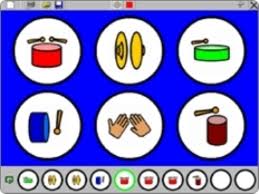Given that this reluctance exists what can we do to support those brave teaching souls who are prepared (despite not being grade 99 piano) to get stuck in? The first place to start is to suss out the teaching staff. If you can't find anyone who teaches music at your school here is some advice
1. Use Sing up.
Even if you work at an unenlightened school that think they they have better things to spend their money do not dismay - you can still stream songs. There are nearly 100 videos on youtube and a whole section on the website with tips and advice. If your school does have membership - even better. You can access the teaching notes and lesson ideas that accompany every song.It isn't aimed at specialist teachers - it is designed to support EVERYONE who works with kids what ever their musical history. And if you do come across a piece of jargon that you don't understand be sure to TELL THEM! It is a really fabulous resource.
Link to Sing Up
2. Find your nearest Music Hub.
Hubs are the latest big idea from the government for organising music education. Mainly they are led by local authority music services. These people are desperate to find teachers who want to champion the arts in school.If you know what you want - suggestions for listening projects, feedback on your kids soundscapes, ideas on how to improve the quality of singing these people will WANT to help you.
Link to list of music hubs
3. Make friends with your ICT coordinator.
Tell them you want to explore technology and music making. Ask for access to the school iPad and then look shocked when they say they don't have one. They will be so pleased you have sought them out there is a good chance they will give you preferential treatment with computer time and help you to explore music technology. Even the most cheapskate school generally has 2Simple music toolkit which can be used on an IWB. If they do have an ipad there are some fantastic apps to use to teach music see my earlier post. Top 3 iPad apps
4. Teaching Music UK
This website may be more detailed than you want but it is jammed full of ideas.I t is really worth registering so you can ask questions on their forum - a very nice person moderates it and will ensure your question is answered. I'm not suggesting he will plan all your music lessons for you but it is a fair bet you will get some brilliant advice and ideas.
Link to Teaching Music
5.Twitter There is a brilliant worldwide teacher community on twitter. Follow some music teachers and get a look at the resources they are sharing. I am on as @JackieSchneider and can point you to lots of music teachers
Here is a presentation I gave at a recent staff meeting to get you going
FINALLY: Don't give up! How ever badly you think it is going what ever you provide will be better than nothing. A calm piece of music to defuse the latest playground scrap - a shared song to bond over - a whole class screeching We are the champions at the tops of their voices, powerful drumming rhythms stamped out and played on the desks - all of these experiences make us more human and are to be celebrated.









